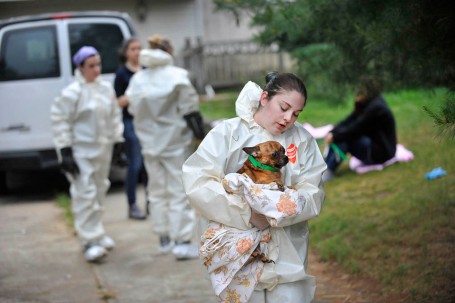 Animal hoarding occurs when an individual is housing more animals than he or she can adequately care for. It is a complex issue that encompasses mental health, animal welfare and public safety concerns. Animal hoarding is defined by an inability to provide even minimal standards of nutrition, sanitation, shelter and veterinary care—often resulting in animal starvation, illness and death. In the majority of cases, animal hoarders believe they are helping their animals and deny this inability to provide minimum care.
Animal hoarding occurs when an individual is housing more animals than he or she can adequately care for. It is a complex issue that encompasses mental health, animal welfare and public safety concerns. Animal hoarding is defined by an inability to provide even minimal standards of nutrition, sanitation, shelter and veterinary care—often resulting in animal starvation, illness and death. In the majority of cases, animal hoarders believe they are helping their animals and deny this inability to provide minimum care.
Not everyone who has multiple animals is an animal hoarder. There are several signs that may indicate someone is an animal hoarder:
- They have numerous animals and may not know the total number of animals in their care.
- Their home is deteriorated (i.e., dirty windows, broken furniture, holes in the wall and floor, extreme clutter).
- There is a strong smell of ammonia, and floors may be covered with dried feces, urine, vomit, etc.
- Animals are emaciated, lethargic and not well-socialized.
- Fleas and vermin are present.
- The individual is isolated from the community and appears to neglect him- or herself.
- The individual insists that all of their animals are happy and healthy—even when there are clear signs of distress and illness.
It has been estimated that there are 900 to 2,000 new cases of animal hoarding every year in the United States, with a quarter of a million animals falling victim. Animals collected range from cats and dogs to reptiles, rodents, birds, exotics and even farm animals.  Animal hoarding is covered implicitly under every state’s animal cruelty statute, which typically requires caretakers to provide sufficient food, water and veterinary care. However, only two states, Illinois and Hawaii, currently have statutory language specifically addressing animal hoarding. In most cases, criminal prosecution of animal hoarding can be a difficult process and may not be the most effective route, since hoarders are often emotionally troubled rather than criminally inclined.
Animal hoarding is covered implicitly under every state’s animal cruelty statute, which typically requires caretakers to provide sufficient food, water and veterinary care. However, only two states, Illinois and Hawaii, currently have statutory language specifically addressing animal hoarding. In most cases, criminal prosecution of animal hoarding can be a difficult process and may not be the most effective route, since hoarders are often emotionally troubled rather than criminally inclined.
If you think someone you know is struggling with animal hoarding, pick up the phone and call your local humane law enforcement department, police department, animal shelter, animal welfare group or veterinarian to initiate the process of getting them—and the animals—the help they need.

